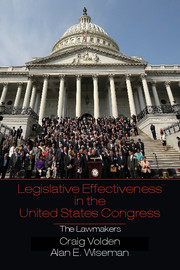Book contents
- Frontmatter
- Contents
- List of Tables and Figures
- Acknowledgments
- 1 Introduction
- 2 Measuring Legislative Effectiveness
- 3 The Keys to Majority-Party Effectiveness in Congress
- 4 A Tale of Three Minorities
- 5 Gridlock and Effective Lawmaking, Issue by Issue
- 6 The Habits of Highly Effective Lawmakers
- 7 The Future of Legislative Effectiveness
- References
- Index
- References
1 - Introduction
Published online by Cambridge University Press: 05 November 2014
- Frontmatter
- Contents
- List of Tables and Figures
- Acknowledgments
- 1 Introduction
- 2 Measuring Legislative Effectiveness
- 3 The Keys to Majority-Party Effectiveness in Congress
- 4 A Tale of Three Minorities
- 5 Gridlock and Effective Lawmaking, Issue by Issue
- 6 The Habits of Highly Effective Lawmakers
- 7 The Future of Legislative Effectiveness
- References
- Index
- References
Summary
Participation in Congress is seldom universal. It is never equal.
– Richard L. Hall. Participation in Congress (1996, p. 2)As the lawmakers left their hometowns and cities scattered across the mountains, prairies, and shores of the United States, they carried with them the goals and concerns of the American people who voted them into office. Arriving in Washington to start the 110th Congress, excitement and ambition were particularly high among Democrats. They had just recaptured the House of Representatives after twelve years of Republican control. They had an opportunity to oppose President George W. Bush in the final years of his second term, and to advance their own agendas in hopes of setting the stage for Democratic control of the presidency in the 2008 elections. Between early 2007 and the fall of 2008, these men and women could confront the president on the unpopular Iraq War and on his tax cuts for big corporations and wealthy Americans. They could also attempt to take the country in new directions, with minimum wage increases, green energy policies, and health policy reforms.
Yet, beyond their collective concerns, each lawmaker was keenly aware of the many local needs of constituents back home. Experienced Democrats knew that this was an opportunity they should not take for granted. Those senior members who had entered Congress under Democratic control prior to the 1994 Republican Revolution had seen the difference in what they could accomplish in the majority party or the minority party. Would they make the most of the situation to help their constituents back home? How effective would they be in advancing their own policy agendas?
- Type
- Chapter
- Information
- Legislative Effectiveness in the United States CongressThe Lawmakers, pp. 1 - 13Publisher: Cambridge University PressPrint publication year: 2014



